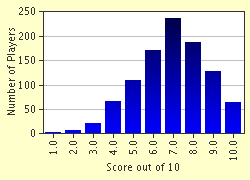Quiz Answer Key and Fun Facts
1. Being absent without permission may be called:___________ leave?
2. Some nationality adjectives may refer to specific 'local recipes'. What is for instance the name for a hard-boiled egg enclosed in sausage-meat, which is then fried and ultimately served as either a cold or a hot platter?
3. What kind of twins are "congenitally" united by part of their bodies?
4. Both "melancholia" and "rickets" have been called the __________ disease.
5. One of the Scandinavian nations gave us a system of therapeutic muscular exercise which is known world-wide as _________________ gymnastics ?
6. Rubella or 3-day measles is also known as the ___________ measles.
7. A certain deep blue pigment, based on ferric ferrocyanide, is usually called ____________ blue?
8. What is the name for a period of dry, surprisingly warm weather usually with hazy conditions, occurring in autumn in the Northern Hemisphere, and often following a first bout of killing frost?
9. The kiwifruit has been called the "Chinese gooseberry", a certain type of dog has been called a "Danish dog", but what is the other name for the jaguar?
10. In olden times armies already used "arms of mass destruction". A certain technique of naval warfare consisted in hurling from siphons, a kind of liquid fire on to enemy ships; this burning fuel then set the ships ablaze. What was the term used for such fire - which had already been invented in 8th century?
Source: Author
flem-ish
This quiz was reviewed by FunTrivia editor
coolupway before going online.
Any errors found in FunTrivia content are routinely corrected through our feedback system.

